Figures for an Apocalypse
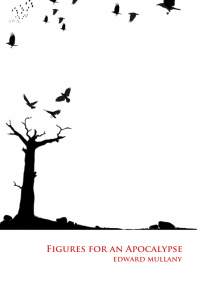 Figures for an Apocalypse
Figures for an Apocalypse
by Edward Mullany
Publishing Genius Press, 2013
198 pages / $14.95 buy from Publishing Genius
Rating: 7.5
Edward Mullany’s newest collection of prose poetry is titled from a book by Thomas Merton. Merton is known for being a Trappist monk and poet, but his poetry receives mixed reviews. In Commonweal, William Henry Shannon lambasts a vast majority of the volumes of Merton’s poetry as “mediocre or just plain bad”; however, Shannon concedes that amongst the thousands of lines of poetry “one will also find fine poetry there.”
In many cases, the mark of fine poetry is to appear effortless—and, perhaps, in some cases craftless. Edward Mullany’s newest poems seem to be nothing more than simple titles with surreal imagery acting as a sort of call and response. Take “The Statues of Weeping Women” for example: “Along empty highways they / were placed at equal / intervals.” That’s the whole poem.
Other pieces in the collection are seemingly plotless, page-length prose poems which simply describe everyday occurrences, as in “The Wrong Child” wherein a girl’s mundane day of school is described in exacting detail:
Or as in “Say No” which starts by saying READ MORE >
January 7th, 2014 / 4:36 pm
Violenzia
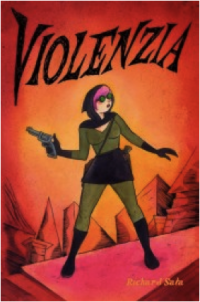 Violenzia
Violenzia
by Richard Sala
Fantagraphics, 2013
51 pages / $4.99 Buy from ComiXology
Rating: 10.0
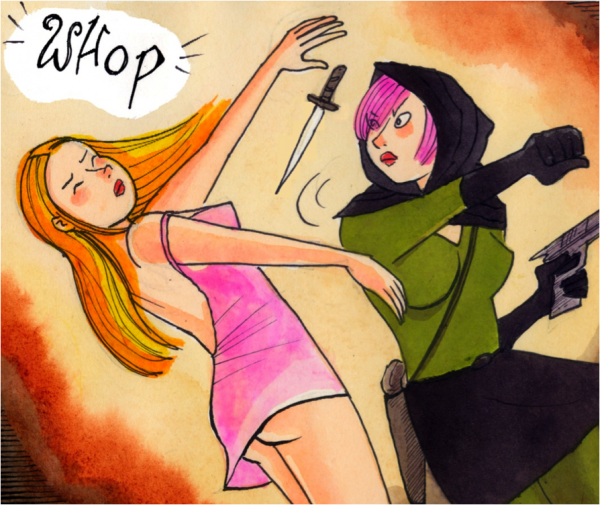
Pacific Rim was my favorite film of 2013 because of its heavy use of science fiction tropes. Guillermo del Toro borrows everything from Neon Genesis Evangelion and G Gundam to Power Rangers and Godzilla. He breathes life into these tropes with innovative concepts like drift compatibility and Lovecraftian aliens from beneath the Pacific. Add in del Toro’s choices to eschew motion capture effects and to cast Charlie Day as the charming and tatted Newt and this film earns a huge place in my heart.
Richard Sala’s Violenzia, his latest digital comic book, operates on a similar level. Sala takes the conventions of Golden Age comics like Dick Tracy and The Shadow and updates them for the digital era. He strips away any true exposition or plot in favor of a taught, fifty-page sequence of action as Violenzia—a hooded vigilante with a shock of magenta hair, twin pistols, and a miniskirt—dispatches members of a moon cult, hillbillies dealing Krokodil, and a ghoulish business exec. duel-wielding a sword and legalese all to get revenge on a nefarious mastermind, and the result is breathtaking.
The book never takes the time to explain who Violenzia is or why she wants to kill the crime boss, but it doesn’t matter. Instead, Violenzia evokes the joy of action comics with lush colors and retro pencilings. READ MORE >
January 2nd, 2014 / 2:23 pm
The Jade Cat
 The Jade Cat
The Jade Cat
by Suzanne Brøgger
Overlook Press, 2009
416 pages / $26.95 buy from Overlook or Amazon
Rating: 8.5
“All families are something something, lick your knees.” – Count Tolstoy
“The same phenomenon that makes the family so intolerable when you are young is precisely what makes it so fascinating when you are old: that concentraion of karma, old memory, and skeletons in the cupboard”– Suzanne Brøgger, The Jade Cat
The Jade Cat, by Danish author Suzanne Brøgger, follows the fortunes of the Løvin family (cosmopolitan Danish Jews) through the course of the 20th century.
Brøgger trades in melancholia, that old reliable bread and butter of Modernist anxiety. And like many great Émigré writers (Nabokov, Dolatov, Mukherjee, Gallant), she populates the novel with fetishes and talismen. Émigré literature trends towards interiors, landscapes of symbolic expression, in an attempt to recreate homeland or conjure the physicality of a lost homeland, and Brøgger nails the inventories of a family trying to hold onto something tangible. READ MORE >
October 24th, 2013 / 11:32 am
The Desert Places
 The Desert Places
The Desert Places
by Amber Sparks and Robert Kloss, illustrated by Matt Kish
Curbside Splendor Publishing, 2013
84 pages / $10.60 buy from Amazon
Rating: 8.5
Evil is ubiquitous. It’s in the best literature and (as I present it to my students) it is the reason why humanity needs literature: as relief from evil and as elucidation for evil. The Desert Places, the new hybrid text by Amber Sparks and Robert Kloss, with illustrations by Matt Kish, depicts the history of malevolence from primordial Earth all the way into a nightmarish technological future. Plenty of other narratives have depicted the fall and subsequent struggle of Lucifer, Chamcha, Grendel, et al., but what sets Sparks’s and Kloss’s narrative apart is its broad scope within such a slim package. READ MORE >
October 17th, 2013 / 6:06 pm
Anonymous Response to Sandra Simonds’s Open Letter to The Poetry Foundation
To Sandra Simonds,
This is an open letter in response to your request that the Poetry Foundation make a strong financial commitment to aid poets facing financial crises and a lack of adequate healthcare.
You say in your open letter that “it is heartbreaking when poets you have admired for years are forced to ask for help with basic necessities,” and I wonder how this is any more heartbreaking than the millions of other Americans struggling financially to make ends meet. How do the struggles of everyday Americans differ, and to what degree, from those problems faced by the poetry community? As poets, we make a decision at some point or another to devote as much of our life to our craft as possible. In doing so, we must acknowledge that to identify as a poet (or artist in general) is a privilege in and of itself; one that comes at certain costs. Primarily, a life of potential financial hardship. But I ask you, Sandra, what American today does not face similar uncertainties facing their financial future?
The difference between poets and the general public is that some of us, like you, Sandra, are fortunate enough to have an audience and a platform to reach them. In today’s rocky economic climate, one governed by debt and political deficit, I do not think it is in the best interest of your audience or the poetry community to model such irresponsible behavior in asking for a financial handout from the Poetry Foundation to support the poets you hold in such romanticized esteem. Poets are people just like everyone else, Sandra. Suggesting that poets deserve compensation simply for the fact of being a poet is insulting, and furthers our reputation for being elitist and disconnected. As a community, I would hope that we had a little more gumption to solve our financial predicament rather than taking the easy route by asking the Poetry Foundation for a handout. I support poets by buying their books. Maybe we, as a community, can figure out how to get our art to a wider audience before we so hastily throw in the towel. READ MORE >
October 15th, 2013 / 8:18 am
Psalm 44
 Psalm 44
Psalm 44
by Danilo Kiš
Dalkey Archive Press, 2012
128 pages / $16.95 buy from Dalkey Archive Press
Rating: 9.0
“The work of Danilo Kiš preserves the honor of literature.”
-Susan Sontag
In his Psalm 44, Danilo Kiš offers something beautiful and immediately important. The novel, set in the Auschwitz concentration camp, confronts deep tragedy.
As a writer, Kiš trends expansive, with long lyrical passages:
“She remembered the return from the village, and her perplexity at not traveling by train (the way they had come) and only then by cart through the fields of rye and poppies, but they covered the whole distance back in a cart, moving continuously alongside the tracks with their thundering haughty trains, and she loved travel by train, as did her mother, who had told her she had loved to travel by train, but just now she said she preferred to lurch along the bumpy village lanes, where there isn’t any way to shield your head and so the sun strikes you directly on the pate, right on the crown of your skull. Then they reached the city and Marija said to her mother that she’d had more than enough of this cart and that she would at least like to ride the streetcar at this pint, to ride the blue one that went from the train station straight to the corner of their street where the chestnut blossoms were…”
September 3rd, 2013 / 6:57 pm
Thank You For Your Sperm
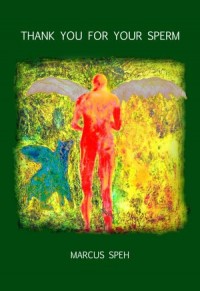 Thank You For Your Sperm
Thank You For Your Sperm
by Marcus Speh
MadHat Press, 2013
188 pages / $15.00 buy from MadHat Press or Amazon
Rating: 8.9
Marcus Speh explores the tender side of absurdity with Thank You for Your Sperm. Though this is flash fiction it lingers in the mind for much longer. Entire histories are suggested in these small pieces. Not a word is wasted either. From the title to the last line Marcus Speh uses language economically. Words playfully jump across the page opening entirely new histories within histories. Geography is a key part of these stories as geography too can suggest a mood with a simple word or two. Berlin specifically gets rather affectionate treatment. How all of this comes together is quite impressive. READ MORE >
August 8th, 2013 / 12:10 pm
Bornholm Night-Ferry
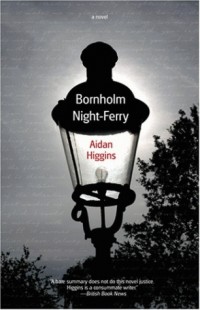 Bornholm Night-Ferry
Bornholm Night-Ferry
by Aidan Higgins
Dalkey Archive Press, 2006
175 pages / $12.95 buy from Dalkey or Amazon
Rating: 9.0
Bornholm Night-Ferry wades through inscrutable regions of a long distance relationship. Aidan Higgins is at turns wistful and heartbreaking as he chronicles this classic “end of an affair” novel.
The novel’s organizing device comes in letters between two lovers separated by a continent—one living in Ireland, the other in the Netherlands—as they flirt, cajole, complain, and desperately attempt to hold onto a brief romance. As a sweet and sad book, the novel explores well-tread ground. First published in 1983, it often recalls Annie Hall and Hopscotch in tone and aesthetic. The lovers pun and namedrop in a pseudo-gliglish patois. Larry Rivers is a central character. READ MORE >
August 1st, 2013 / 3:17 pm
Blackest Ever Hole
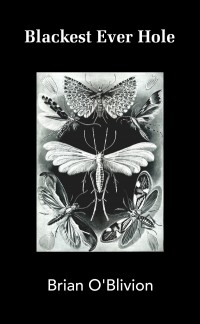 Blackest Ever Hole
Blackest Ever Hole
by Brian O’Blivion
gnOme Books, 2013
78 pages / $7.77 buy from CS or Amazon
Rating: 8.8
In a space of punishing violence, in a realm where black is light, Blackest Ever Hole exists as a crossing of the abyss to temper horror into poetry. This is where “the steepest vertigo pulses,” where volatile suns implode under the weight of shadows. Black is the color of annihilation, and annihilation here breeds horror. These are Plutonian visions that go beneath our planetary crust and deep into the place of the beast. In this vortex of horror lies the human shadow eager for integration, and I’m specifically impressed with O’Blivion’s use of genre as a lens of perception through which his awareness is filtered. This is a journey through the infernal abyss of the blackest black to “a total terror death.” READ MORE >
July 18th, 2013 / 2:53 pm
When Kerosene’s Involved
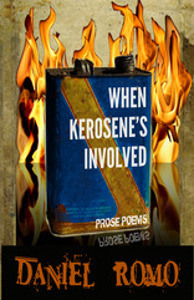 When Kerosene’s Involved
When Kerosene’s Involved
by Daniel Romo
Black Coffee Press, 2013
100 pages / $12.95 buy from Amazon
Rating: 9.0
Confession: I bought this book because the cover is pretty rad. I don’t even know how I came across the book, but I’m glad I did. The poems in here, as the title and cover suggest, are bundles of fire. Upon reading, the embers blaze into your guts and you are left a charred individual. Romo skillfully blends fantasy and narrative, pop culture and persona poems, while adhering to the integrity of the prose poem. Make no mistake: THESE are “prose” “poems.” They are not glorified flash-fiction incorrectly labeled as prose poetry, as much writing is today. The poetry in the book is first, foremost, and evident. Take the book’s first lines from the first poem, “Singe.”
Grandpa Manuel burned the beaks of chicks. Scooped them up in his rancher hands and played agricultural matchmaker: searing metal kissing their tiny mouths.
July 9th, 2013 / 12:09 pm
